[2007] 1 SLR(R) 629 - Singapore Law
[2007] 1 SLR(R) 629 - Singapore Law
[2007] 1 SLR(R) 629 - Singapore Law
You also want an ePaper? Increase the reach of your titles
YUMPU automatically turns print PDFs into web optimized ePapers that Google loves.
658 SINGAPORE LAW REPORTS (REISSUE) [<strong>2007</strong>] 1 <strong>SLR</strong>(R)<br />
later addition of s 12(7) cannot affect the reasons for including them in the<br />
original Bill. It should also be noted that ss 6 and 7, by themselves, provide<br />
all the interim relief that is necessary to protect the claims of the claimants<br />
until the disposal of the substantive claims. It is not necessary to resort to<br />
s 12(7) for any additional relief or measures to protect his claims pending<br />
the disposal of the arbitral dispute. Hence, for this reason also, the existence<br />
of ss 6 and 7 cannot affect the interpretation of s 12(7) of the IAA.<br />
The decision of this court on the scope of section 12(7) of the IAA<br />
59 In our view, the collective weight of the reasons given in [40] to [58]<br />
above, but in particular the implications of the over-reaching argument of<br />
counsel for Swift-Fortune, we agree with the decision of Prakash J and hold<br />
that s 12(7) was not intended to apply to foreign arbitrations but only<br />
<strong>Singapore</strong> international arbitrations. For this reason, s 12(7) does not give<br />
power to the court to grant interim measures, including Mareva<br />
interlocutory relief, to assist foreign arbitrations. But for another reason<br />
which is discussed in [60] to [61] below, s 12(7) does not independently<br />
confer on the court any power which it does not have in relation to a cause<br />
of action or proceeding before it.<br />
What is the scope of section 12(7) of the IAA in relation to the court’s<br />
power to grant interim measures?<br />
60 At this juncture, we would like to consider one other issue on<br />
interpretation in connection with the second qualifier in the text of s 12(7)<br />
of the IAA. Prakash J held that s 12(7) is an enabling and not a declaratory<br />
provision, without determining what is being enabled. Ang J however ([4]<br />
supra at [18]) paraphrased s 12(7) to mean that the court has the power to<br />
make for the purpose of and in relation to foreign arbitration orders those<br />
matters (like those under ss 12(1)(g), 12(1)(h) and 12(1)(i)) which it could<br />
have made if the matter referred to arbitration had been tried as a court<br />
action. This meaning carries with it two implications: first, s 12(7) is an<br />
independent source of statutory power for the court to grant the orders or<br />
reliefs set out in s 12(1), and secondly, the arbitral dispute is to be treated as<br />
if it were a cause of action being heard in a court of law. Is this a correct<br />
paraphrase of the second qualifier in s 12(7)? This is not an academic<br />
question. It is an important question because if Prakash J was wrong on this<br />
point, it would have meant that even if Swift-Fortune were to succeed on<br />
the interpretation issue regarding s 12(7), it would still have to cross<br />
another hurdle.<br />
61 It is necessary to take another look at s 12(7). It provides:<br />
The High Court or a Judge thereof shall have, for the purpose of and in<br />
relation to an arbitration to which this Part applies, the same power of<br />
making orders in respect of any of the matters set out in subsection (1)


![[2007] 1 SLR(R) 629 - Singapore Law](https://img.yumpu.com/7082457/30/500x640/2007-1-slrr-629-singapore-law.jpg)
![[2011] 1 SLR 727 - Singapore Law](https://img.yumpu.com/51140774/1/166x260/2011-1-slr-727-singapore-law.jpg?quality=85)
![[1983-1984] SLR(R) 447 - Artic Builders & Co - Singapore Law](https://img.yumpu.com/50909204/1/164x260/1983-1984-slrr-447-artic-builders-co-singapore-law.jpg?quality=85)
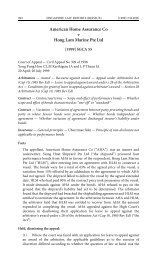
![[1996] 2 SLR(R) 292 - Lim Eng Hock Peter v ... - Singapore Law](https://img.yumpu.com/47482222/1/164x260/1996-2-slrr-292-lim-eng-hock-peter-v-singapore-law.jpg?quality=85)
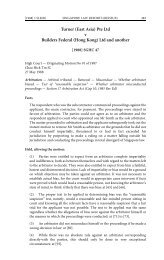
![[2006] 1 SLR(R) 197 - PT Asuransi Jasa Indonesia - Singapore Law](https://img.yumpu.com/46425352/1/164x260/2006-1-slrr-197-pt-asuransi-jasa-indonesia-singapore-law.jpg?quality=85)
![[1985-1986] SLR(R) 503 - Woh Hup (Pte) - Singapore Law](https://img.yumpu.com/45676364/1/164x260/1985-1986-slrr-503-woh-hup-pte-singapore-law.jpg?quality=85)
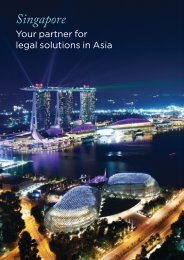
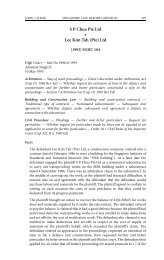
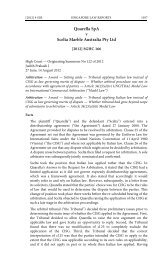
![[2010] 2 SLR 821 - Singapore Law](https://img.yumpu.com/43145563/1/166x260/2010-2-slr-821-singapore-law.jpg?quality=85)
![[2007] 1 SLR(R) 597 - PT Asuransi Jasa Indonesia - Singapore Law](https://img.yumpu.com/42983489/1/164x260/2007-1-slrr-597-pt-asuransi-jasa-indonesia-singapore-law.jpg?quality=85)
![[1989] 1 SLR(R) 433 - Singapore Law](https://img.yumpu.com/42649524/1/164x260/1989-1-slrr-433-singapore-law.jpg?quality=85)
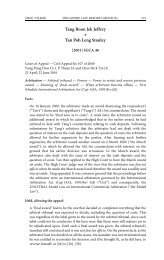
![[1997] 3 SLR(R) 360 - Singapore Law](https://img.yumpu.com/42287507/1/164x260/1997-3-slrr-360-singapore-law.jpg?quality=85)